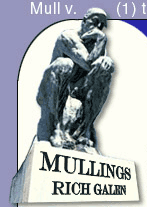

A Positive Move on Mortgages
Friday December 7, 2007
Click here for an Easy Print Version
FINAL
D A Y
This is the final day of the annual MULLING Subscription Drive. For those of you who have subscribed, thank you.
For those of you who have been meaning to, today would be the perfect day to go to the Subscription Renewal Page and subscribe.
If you can't subscribe this year, please enjoy MULLINGS on me.
I you can, please take a second now and go to the Subscription Renewal Page.
Thank you.
Rich
-----
You might have heard or read about the situation in home mortgages. Over the past decade, or so, the prices of residential housing has been rising and rising and rising leading to people to buy larger and more expensive houses than they could afford.
I am not a housing or mortgage expert, but I believe this to be approximately the way it worked.
The arithmetic is simple: If you have a $100,000 house whose value is rising at 20% per year has the effect of being a part-time job earning an additional $20,000.
So, the theory went, if you can score a house worth $250,000 and IT is rising at 20% per year, your part-time job is now $50,000 per year.
Under traditional lending rules, if you wanted to buy a house worth $100,000 you would first have to plunk down $20,000 as a down payment leaving $80,000 to be financed.
According to one mortgage calculator site, a 30-year, 5.75% loan for 80 grand would require a monthly payment of $466.86 per month.
If you wanted to buy a house worth $250,000 and you wanted to finance the entire amount, a 30-year fixed mortgage would be $1,458.93 per month.
Many people couldn't afford $1,400 a month so new, modern, non-traditional mortgage "products" were invented - under the general heading of "Adjustable Rate Mortgages (ARMs) - which would allow you to pay far less. Maybe not much more than the amount you would have to pay for that $100,000 house.
But two things were going on: First, the additional $1,000 per month you SHOULD have been paying wasn't being forgiven; it was being added to the price of the house. So, after one year your $250,000 house now had a mortgage of $262,000 ($1,000 x 12 months).
Second, the "introductory rate" of 5.75 percent would "reset" to something on the order of 11% beginning in 2008.
At that point, instead of a monthly payment of about $500 for your quarter of a million dollar house, you would have to pay the full amount of nearly $2,500 per month ($262,000 at 11% for 30 years).
Most of us don't have a spare two grand per month sitting around looking for something to be spent on and in short order your mortgage would fall behind, go into default and, ultimately your house would be foreclosed and be the proud possession of whatever organization ended up owning your mortgage.
I understand there are other costs involved, mortgage insurance, fees, closing costs, etc, but as I said, this is approximately the way it worked.
Came the bursting of the housing bubble and suddenly your $250,000 house wasn't rising in value by $50,000 per year. In fact, it wasn't rising in value at all. In many markets your house was losing value because others with sub-prime mortgages found themselves in the same situation of being unable to pay a mortgage four or five times higher than when they first moved in, so houses were being dumped on the market driving down values for all the houses in a neighborhood.
The White House as well as the Treasury Department and the Department of Housing and Urban Development have worked out a plan with the major mortgage lenders which according to the White House Fact Sheet will help people with sub-prime mortgages either
- Have their interest rate frozen for up to five years;
- Move them into an FHA loan; or
- Refinance an existing loan into a new private mortgage.
This program will not affect everyone with an unaffordable ARM. According to USA Today's summary, it only applies to people who live in their houses; whose mortgages are now current, and who have not missed more than one payment in the previous 12 months. There are other qualifications which you can read on the Secret Decoder Ring page but those are the major points.
A home mortgage is a contract. Contracts are renegotiated all the time on the theory that 80% of something is better than 100% of nothing. Home mortgages are not generally re-written because homeowners don't generally have the clout to go against a major bank the way an airline or auto maker does.
This appears to be a good deal for everyone concerned. There is no taxpayer money involved. It is a deal worked out with lenders who, otherwise, would be facing perhaps an additional 1.2 MILLION foreclosures. And, people who have been living up to their end of the bargain, will be able to stay in their homes.
The Bush Administration deserves kudos for getting this done as quickly as it has.
On the Secret Decoder Ring page today: Links to the White House Fact Sheet, the Mortgage Calculator website and the USA Today Q & A on the program.
Also a Mullfoto of a scene which was so strange, I went around the block, parked, and took it; and a Catchy Caption of the Day found by Mullpal Ginny Wolfe.
--END --
Copyright © 2007 Barrington Worldwide, LLC
Become a
Paid Mullings Subscriber!
(To join the FREE mailing list or to unsubscribe Click Here)

Current Issue |
Secret Decoder
Ring | Past
Issues | Email
Rich | Rich
Who?
Copyright �2006 Richard
A. Galen | Site design by Campaign
Solutions. |





 US & Int'l Papers
US & Int'l Papers